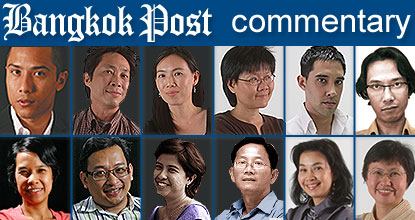
What was it like to kill? Dispatching people violently by the hundreds - neighbours, strangers, acquaintances, friends - one by one, by beating or strangling, by knife or by gun, with threats and smiles, all with the tacit consent of the army? How do they feel, after all these years?
Proud, of course.
Proud enough to recount those dark deeds in detail, as Anwar Congo does.
"At first we beat them to death, but there was so much blood," says the lanky Mr Congo from North Sumatra, Indonesia. "To avoid the blood, I used this system ... Can I show you?"
With glib pragmatism, Mr Congo shows us how from 1965 to 1969 - after the military overthrew the Indonesian government and embarked on a massive purge of their opponents by accusing them of being communists - he devised a homemade execution method using a wire tied to a post with a stick, twisting a homicidal tourniquet as he strangled his victims. No blood, no mess. Just deaths.
The senseless murders of "communists" and historical benightedness of them are the subjects of the strange and horrifying documentary film The Act of Killing, directed by Joshua Oppenheimer. In the month of October, where 40 years (and 37 years ago here in Thailand), senseless killings and the subsequent historical blurring of them took place, this film about Indonesian atrocities has a stinging resonance. Good for us then: The Act of Killing will be shown here for the first time at the Foreign Correspondents' Club on Monday, followed by a Skype talk with the director, and again at the Lido theatre on Oct 19, followed by a discussion with local scholars.
In the film, we follow two men, Mr Congo, whose mannerisms are a cross between a reptile and a tribal witch doctor, and his portly sidekick, Herman Koto, a Jabba the Hutt-like associate. In their youth, both of them were gangsters and killers of communists. They would "interrogate" the suspects - opponents of the military dictatorship and citizens of Chinese descent - promptly get the confessions they wanted and kill them. What's hair-raising is that Mr Congo and Mr Koto talk about their crimes as a death squad, which for them aren't deadly or criminal, so casually to the camera, boasting and agreeing to re-enact their killings, in realistic setup as well as in fantastical episodes that give the film an even more bizarre and unnerving quality. Mr Congo and Mr Koto are thugs, cads, zombies and clowns, scary clowns, pathetic in their moral oblivion, and their happy recollection of those days of killing makes us wonder if such brutality - in Indonesia but also in Auschwitz, Guantanamo, Afghanistan or Thailand, particularly the chair saga of Oct 6, 1976 - is a historical anomaly or proof of the barbaric possibilities in us all.
Oppenheimer's film would have been a chilling experience regardless of when it was shown, but the memories of our Octobers 1973 and 1976 add a layer of relevance to the screenings. Communism is no longer a threat, but it once was, and the grip of paranoia resulted in so many deaths here, too. What's more chilling than the killings, however, is how men like Mr Congo take it for granted that they have done nothing wrong, that the passage of time, of history, of successive governments, appointed or elected, have absolved them, or condoned their acts of killing with ignorance and even approval.
In the documentary, we see Mr Congo and Mr Herman hang out with high-ranking government officials, who compliment them for their services in the past. I'm not saying thugs hang out with MPs here in Thailand, but what do I know? The point is that without a thorough examination of history by later generations - so many nooks and crannies of our Oct 6 remain obscure, for instance - our perspective is partially blind, skewed, and soon what happened will be stuck safely in perpetual haze and our sense of right or wrong will become gnarled and twisted. Everything, at worst, will be forgotten.
The Act of Killing would make a great double bill with Rithy Panh's S21: The Khmer Rouge Killing Machine, which asks the guards of the infamous Tuol Sleng prison in Phnom Penh to re-enact their crimes and to meet with their former prisoners who survived the genocide. History (and movies) have shown that the systematic inculcation of hate - one of the culprits of our Oct 6 incident - is the ugliest crime, theoretically as vicious as if not more than the murders themselves. In The Act of Killing, the scene I find most abominable is when Mr Congo visits an old friend, an editor who in the 1960s published a pro-military, anti-communist newspaper. "As a newspaper man," says the editor casually, "my job is to make people hate them."
Let's hope history doesn't repeat itself, here, there and everywhere.
Kong Rithdee is Deputy Life Editor, Bangkok Post.



